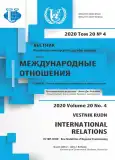Transformation of Uzbekistan’s Approaches to Afghanistan after 2016
- Authors: Pritchin S.A.1
-
Affiliations:
- Institute of World Economy and International Relations, RAS
- Issue: Vol 20, No 4 (2020): New Modalities of Regional Peacekeeping
- Pages: 781-790
- Section: BILATERIAL RELATIONS
- URL: https://journal-vniispk.ru/2313-0660/article/view/320260
- DOI: https://doi.org/10.22363/2313-0660-2020-20-4-781-790
- ID: 320260
Cite item
Full Text
Abstract
With its key geostrategic position in the center of the Eurasian continent, Uzbekistan has a prominent impact on the nature of the development of interregional relations in Central Asia. After the transit of power in the republic that took place in 2016, a gradual transformation of Uzbekistan’s foreign policy model was carried out - from a closed and isolated to a proactive one. This led to several major changes - there was a significant improvement in both the nature of cooperation and the regional dialogue between the countries of Central Asia. The author analyzes the changes in Uzbekistan’s foreign policy in the Afghan direction, their reasons and the impact they had on the position of the republic both in the Central Asian region and in the international arena. This is especially relevant given both the importance of Afghanistan and Uzbekistan as partners for each other and the degree of threats posed by the difficult internal political situation in Afghanistan and holding back their bilateral interaction. As a methodological basis for the study, we used a systematic and comparative analysis of Uzbekistan’s approaches to solving security issues through the implementation of its foreign policy towards Afghanistan until 2016 and after. They also considered both internal factors influencing the formation of Uzbek approaches to the southern neighbor, and external ones. The theory of political realism was used as a theoretical basis for the study. The change of power in Uzbekistan in 2016 marked a radical revision of Tashkent’s approaches to the Afghan vector of its foreign policy. Uzbekistan has begun to implement a strategy to stabilize the situation in Afghanistan through the pragmatic development of economic cooperation and support for a peaceful inter-Afghan dialogue, abandoning a rigid isolation policy towards its southern neighbor. At the same time, the main emphasis in mediation activities was placed on formats that were supported by the United States. Thus, today, thanks to the revitalization of its Afghan agenda, Uzbekistan is actively increasing its authority in the international arena as an important regional player for Afghan regulation.
Keywords
About the authors
Stanislav Aleksamdrovish Pritchin
Institute of World Economy and International Relations, RAS
Author for correspondence.
Email: pritchin.stanislav@yandex.ru
PhD in History, Senior Research Fellow, Center for post-Soviet Studies
Moscow, Russian FederationReferences
- Adilkhodjaeva, S.M. (2017). The Aggravation of the Situation in Afghanistan: New Threats to Peace and the Ways of Their Prevention. Comparative Politics Russia, 8 (4), 73—82. (In Russian). doi: 10.18611/2221-3279-2017-8-4-73-82
- Amanbekova, Sh. (2019) Afghan Drug Traffic and Regional Security Problems in Central Asia. Post-Soviet Studies, 3, 1103—1110. (In Russian).
- Arunova, M.R. (2014). The Afghan Problem and Neighboring Muslim Countries. Islam in the Middle East, 8, 492—509. (In Russian).
- Copley, G.R. (2020). Uzbekistan Re-Emerges as the Strategic “Heartland of the Heartland”. International Relations: Politics, Economics, Law, 2019 (34), 17—24. URL: https://uzjournals.edu.uz/intrel/vol2019/iss34/2 (accessed: 19.07.2020).
- Ergashev, B. (2013). Uzbekistan’s Policy towards Afghanistan in the Context of Ensuring Regional Security in Central Asia. In: Kobrinskaya, I.Ya. (Eds.). Challenges to Security in Central Asia. Moscow: IMEMO RAN publ. P. 96—99. (In Russian).
- Fjæstad, K. & Kjærnet, H. (2014). Performing Statehood: Afghanistan as an Arena for the Central Asian States. Central Asian Survey, 33 (3), 312—328. doi: 10.1080/02634937.2014.941713
- Ganiev, T.A. & Karyakin, V.V. (2018). Military and Political Situation in the Islamic Republic of Afghanistan and Its Impact on the Security in the Central Asian Region of the CIS. Archon, 5 (8), 12—20. (In Russian).
- Ivanenko, V. (2015). The Afghan Knot: Conceptual Features of U.S. Strategy in Afghanistan and Eurasia. Russia and the Moslem World, 7, 33—43.
- Konarovsky, M.А. (2017). Afghanistan after 2014. International Organisations Research Journal, 12 (3), 242—253. (In Russian). doi: 10.17323/1996-7845-2017-03-242
- Laruelle, M. & Peyrouse, S. (2015). Globalizing Central Asia: Geopolitics and the Challenges of Economic Development. London: Routledge, Taylor & Francis Group.
- Laumulin, M. (2013). Central Asia: Security in the Context of post-2014 Afghanistan. Central Asia and the Caucasus, 14 (3), 7—19.
- Malysheva, D.B. (2017). The Afghan Crisis and Post-Soviet Central Asia. Mirovaya ekonomika i mezhdunarodnye otnosheniya, 61 (8), 14—23. (In Russian). doi: 10.20542/0131-2227-2017-61-8-14-23
- Malysheva, D.B. (2018). Post-Soviet Central Asia and Afghanistan at the Intersection of the Major Asian states’ Interests. Vestnik RUDN. International Relations, 18 (2), 259—272. (In Russian). doi: 10.22363/2313-0660-2018-18-2-259-272
- Masaulov, S. (2013). Afghanistan 2014: Uncertainty and Risks in the Development of the Political Situation in Central Asia. Central Asia and the Caucasus, 6 (3), 75—84. (In Russian).
- Morozov, Yu.V. (2018). Issues and Prospects of Interaction among States Concerned and Their Alliances in Afghanistan. National Interests: Priorities and Security, 14 (5), 955—971. (In Russian).
- Ogurtsov, M. I. (2018). Afghan Factor in American-Uzbek Relations in 2001—2014. Social Sciences and Humanities. Domestic and Foreign Literature. Series 9: Oriental and African Studies, 3, 38—50. (In Russian).
- Ponomareva, E.G. & Rudov, G.A. (2011). Afghan Factor in the Policy of Central Asian Countries. Observer, 11, 109—120. (In Russian).
- Popov, D. (2014). Central Asian Countries’ Involvement in Supplying US Troops in Afghanistan. National Strategy Issues, 1, 62—80. (In Russian).
- Popov, D.S. (2015). The Role of Uzbekistan in US Central Asian Policy. National Strategy Issues, 1, 74—90. (In Russian).
- Sal’nikova, A.V. (2009). Afghanistan in the Policy of Great Britain and Russia in the Late 19th — Early 20th Centuries. Izvestia: Herzen University Journal of Humanities & Sciences, 99, 53—58. (In Russian).
- Star, S.F. & Cornell, S.E. (Eds.). (2018). Uzbekistan’s New Face. London: Rowman & Littlefield.
- Syroezhkin, K. (2013). Problem — 2014 and Security of Central Asia. Central Asia and the Caucasus, 14 (3), 21—33.
- Tolipov, F. (2014). Central Asia and Afghanistan: The Security Complex Dilemma. Central Asia and the Caucasus, 15 (3), 91—103.
Supplementary files









